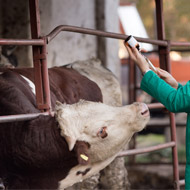Government responds to AMR report

"It's encouraging that the response also emphasised the need for all health sectors to play their part in ensuring positive steps are taken to preserve these essential drugs for future generations."
The government has published its response to Jim O'Neill's review of antimicrobial resistance (AMR), which made recommendations on how to address this growing threat to public health.
No new classes of antibiotics have come into clinical practice since 1987. If reliable drugs are lost, straightforward procedures such as chemotherapy and hip replacements will become more and more dangerous.
Outlining its response to the O'Neill review, the government said it is investing £265 million through the Fleming Fund to improve laboratory capacity and international surveillance systems. Another £50 million will kick start a global AMR innovation fund and further funding will help to develop ground-breaking diagnostic tools.
The response has been largely welcomed by the BVA and RUMA, with BVA president Sean Wensley praising the government for taking a one health approach to the issue.
"It's encouraging that the response also emphasised the need for all health sectors to play their part in ensuring positive steps are taken to preserve these essential drugs for future generations, with the reduction of antibiotic use in animal agriculture just one piece of the jigsaw."
In response to O'Neill's recommendations Defra has committed to a reduction in the use of antibiotics in livestock and fish farmed for food, to a multi species average of 50mg/kg by 2018. The government will also aim to improve animal disease prevention, and will work alongside veterinary bodies and species experts to agree a set of rules for antibiotics that are of critical importance to human health, to ensure these are only used as a last resort.
The report states: 'We envisage a significant increase in regulatory oversight of veterinary antibiotics compared with current legislative requirements, enabling restrictions, or even bans, in animals on use of antibiotics of highest priority and critical importance to people, based on scientific recommendations and an evidence based approach.'
Commenting on this pledge, Mr Wensley said: "BVA has opposed the introduction of arbitrary, non-evidence based target setting; such targets, to reduce antibiotic use, risk restricting vets' ability to treat animal diseases, which could have serious public health and animal welfare implications.
"However, we accepted that evidence-based targets to reduce usage in animal agriculture were likely to form part of the solution to address AMR on a global scale - as the government has confirmed."
Similarly, RUMA welcomed the government's response but raised concerns about how the proposed multi-agency approach will work and whether the industry can access the capital investment required to reduce the need for antibiotics in farming.



 The veterinary mental health charity Vetlife is inviting the veterinary community to join it for a sponsored cold-water dip.
The veterinary mental health charity Vetlife is inviting the veterinary community to join it for a sponsored cold-water dip.